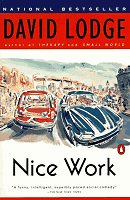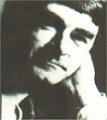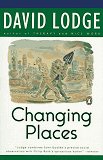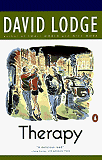
 Nice Work by David Lodge (hier online bestellen)
Nice Work by David Lodge (hier online bestellen)
The story:
The setting is the industrial heartland of Thatcherite Britain in the early 1980's.
The 'Industry Year Shadow Scheme' is a government initiative to help academic thinkers to understand the
practical industries.
In Nice Work a British government program designed to foster mutual understanding between the academy and the
outside world ends up doing (strangely enough) exactly what it intends. Robyn Penrose, a temporary lecturer in
English literature at the university, is assigned to "shadow" Vic Wilcox, who runs a factory. Robyn's temporary
status makes her at once vulnerable to receiving such an undesirable assignment and consumed by the quest for
a tenured position somewhere – "nice work if you can get it," as they say, and hence the title. Her fashionable
leftist world view leaves her completely unprepared for the everyday realities of Vic's occupation. The clash
of ideologies and lifestyles is deftly drawn and delightful to read.
The cautious reader should note that there is some fairly candid description of sexual matters here and there
in the novel, as the "mutual understanding" goes a bit farther than the government intended.
Extract from book:
A typical instance of this was the furious argument they had about the Silk Cut advertisement...
Every few miles, it seemed, they passed the same huge poster on roadside hoardings, a photographic
depiction of a rippling expanse of purple silk in which there was a single slit, as if the material
had been slashed with a razor. There were no words in the advertisement, except for the Government
Health Warning about smoking. This ubiquitous image, flashing past at regular intervals, both irritated
and intrigued Robyn, and she began to do her semiotic stuff on the deep structure hidden beneath its bland
surface.
It was in the first instance a kind of riddle. That is to say, in order to decode it, you had to know that
there was a brand of cigarettes called Silk Cut. The poster was the iconic representation of a missing name,
like a rebus. But the icon was also a metaphor. The shimmering silk, with its voluptous curves and sensuous
texture, obviously symbolized the female body, and the elliptical slit, foregrounded by a lighter colour
showing through, was still more obviously a vagina. The advert thus appealed to both sensual and sadistic
impulses, the desire to mutilate as well as penetrate the female body.
Vic Wilcox spluttered with outraged derision as she expounded this interpretation. He smoked a different
brand himself, but it was as if he felt his whole philosophy of life was threatened by Robyn’s analysis of
the advert. ‘You must have a twisted mind to see all that in a perfectly harmless bit of cloth,’ he said.
‘What’s the point of it, then?’ Robyn challenged him. ‘Why use cloth to advertise cigarettes?’
‘Well, that’s the name of ‘em, isn’t it? Silk Cut. It’s a picture of the name. Nothing more or less.’
‘Suppose they’d used a picture of a roll of silk cut in half - would that do just as well?’
‘I suppose so. Yes, why not?’
‘Because it would look like a penis cut in half, that’s why.’
He forced a laugh to cover his embarrassment. ‘Why can’t you people take things at their face value?’
‘What people are you referring to?’
‘Highbrows. Intellectuals. You’re always trying to find hidden meanings in things. Why? A cigarette is a
cigarette. A piece of silk is a piece of silk. Why not leave it at that?
‘When they’re represented they acquire additional meanings,’ said Robyn.
‘Signs are never innocent. Semiotics teaches us that.’
‘Semi-what?’
‘Semiotics. The study of signs.’
‘It teaches us to have dirty minds, if you ask me.’
‘Why do you think the wretched cigarettes were called Silk Cut in the first place?’
‘I dunno. It’s just a name, as good as any other.’
About the author:
 Critic and novelist. Born in 1935 in Dulwich , south London and was a pupil at St. Joseph's Academy, Blackheath, a
Catholic school. He attended University College, London (UCL) from 1952 until 1955, where he read English.
Following his graduation he undertook national service. He then returned to UCL to complete a large MA thesis on catholic fiction. He held posts at the School
of English, University of Birmingham , from 1960, subsequently becoming a Professor in 1976 until his
retirement in 1987. He was made Honorary Professor of Modern English Literature at the University following
his early retirement which he took in order to devote all his time to writing.
Critic and novelist. Born in 1935 in Dulwich , south London and was a pupil at St. Joseph's Academy, Blackheath, a
Catholic school. He attended University College, London (UCL) from 1952 until 1955, where he read English.
Following his graduation he undertook national service. He then returned to UCL to complete a large MA thesis on catholic fiction. He held posts at the School
of English, University of Birmingham , from 1960, subsequently becoming a Professor in 1976 until his
retirement in 1987. He was made Honorary Professor of Modern English Literature at the University following
his early retirement which he took in order to devote all his time to writing.
He has published eleven novels, the latest Thinks , appearing in March 2001. His style in fiction has swung
between realism and parodies of literary styles and his knowledge of academic circles has often been used to
great effect. One of his most enduring works is Nice work (1988) which is a re-working of the popular
19th century industrial novel of Elizabeth Gaskell and others, and is set in the West Midlands.
Other well known novels include the satirical campus novels Changing Places (1975) and its sequel, Small
World (1984) which have been compared with the work of Kingsley Amis in Lucky Jim (1954) and early
Malcolm Bradbury. David Lodge's thoughts on religion in 1970's Britain forms the the background to
How far can you go (1978), a study of moral and sociological change.
During his long career at the University of Birmingham he wrote several critical studies on modern literary
trends and on specific literary figures, including Graham Greene and Evelyn Waugh. Language of fiction (1966)
remains one of his most important critical works. More recent work includes The Novelist at the Crossroads (1971) and Write on (1986).
Buchdaten:
Nice Work by David Lodge
Sprache: Englisch
Taschenbuch - 288 Seiten - Penguin Books
Erscheinungsdatum: 1. Juli 1990
ISBN: 0140133968
Preis: € 13,50
If you want to buy this book second hand
very good condition - (Penguin paperback, 1984),
send me an eMail
The price of it is € 9 incl. postage.
More works from the same author:
zurück zur Übersicht
|
 Nice Work by David Lodge (hier online bestellen)
Nice Work by David Lodge (hier online bestellen)
 Critic and novelist. Born in 1935 in Dulwich , south London and was a pupil at St. Joseph's Academy, Blackheath, a
Catholic school. He attended University College, London (UCL) from 1952 until 1955, where he read English.
Following his graduation he undertook national service. He then returned to UCL to complete a large MA thesis on catholic fiction. He held posts at the School
of English, University of Birmingham , from 1960, subsequently becoming a Professor in 1976 until his
retirement in 1987. He was made Honorary Professor of Modern English Literature at the University following
his early retirement which he took in order to devote all his time to writing.
Critic and novelist. Born in 1935 in Dulwich , south London and was a pupil at St. Joseph's Academy, Blackheath, a
Catholic school. He attended University College, London (UCL) from 1952 until 1955, where he read English.
Following his graduation he undertook national service. He then returned to UCL to complete a large MA thesis on catholic fiction. He held posts at the School
of English, University of Birmingham , from 1960, subsequently becoming a Professor in 1976 until his
retirement in 1987. He was made Honorary Professor of Modern English Literature at the University following
his early retirement which he took in order to devote all his time to writing.
